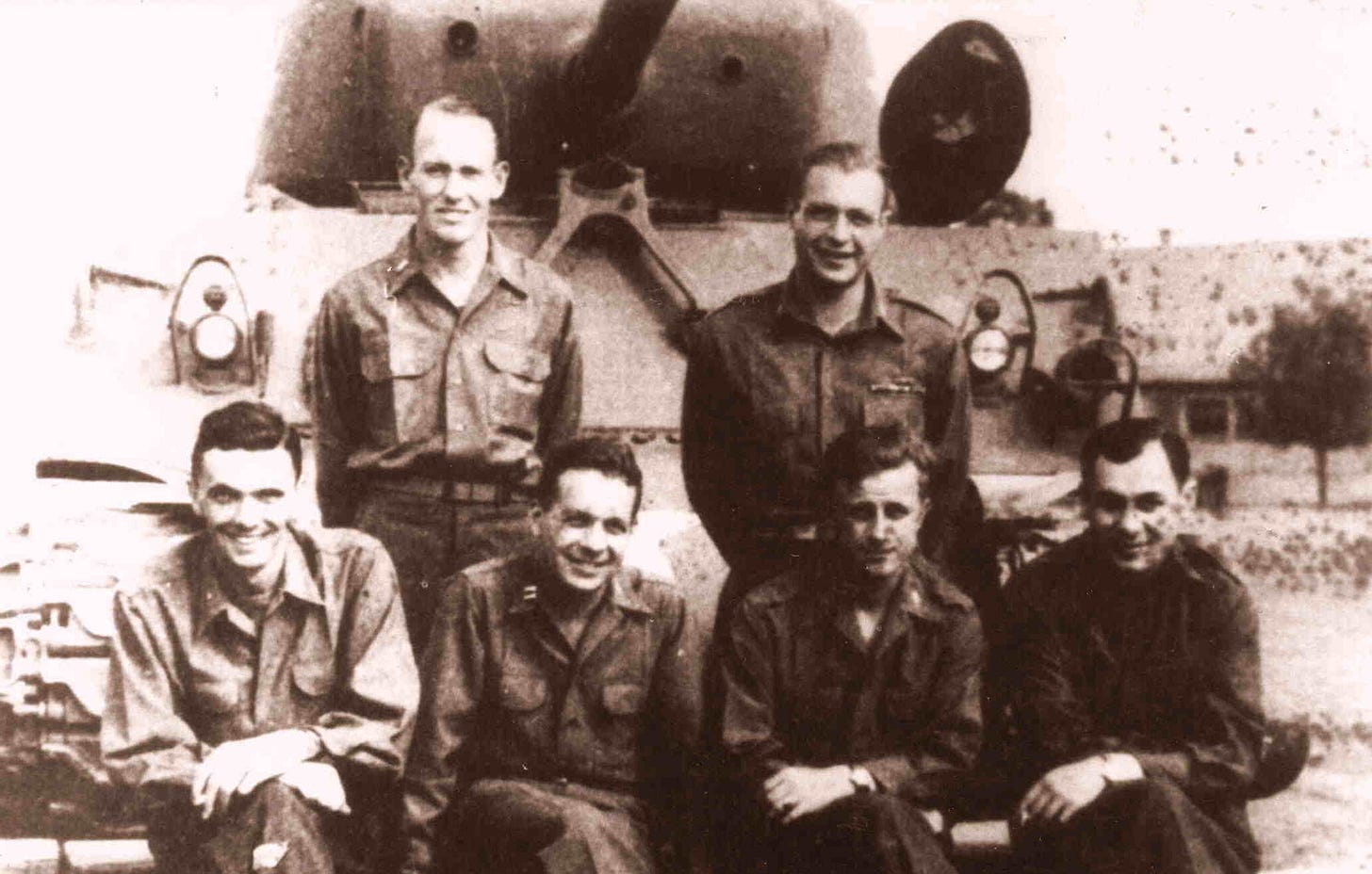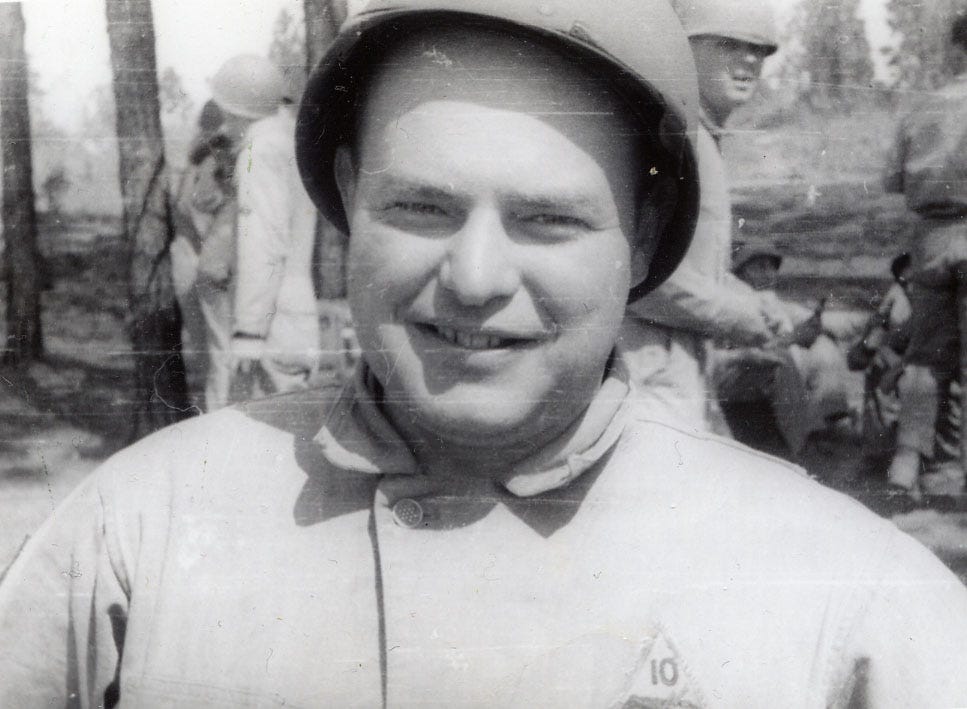Bob Hagerty's First War Story
With 11 months in combat and an encore in Korea, it wouldn't be his last

“One time we were on a road in some little rural area in Germany,” Bob Hagerty, a lieutenant in A Company of the 712th Tank Battalion, said. “The infantry was with us and they were on either side of the road. They were getting fire from something, whether it was a tank or an artillery piece that was up in a wooded area, quite far down the road, maybe a thousand yards. You had to strain to see it. And this infantry officer said, ‘Can you get that gun out there?’ I said ‘Well, where is it?’ And he’s trying to describe, and I said, ‘Hold on a minute.’ Now the gun they’re saying is maybe a thousand yards out there, and there’s a little tiny clearing but it’s over to the right of that. My gunner’s name was Ted, and he couldn’t see it either, so he suggested that he take the shell out of the chamber and look down the gun barrel.
“Ted opened up the breach and he said, ‘I can't see a damn thing.’ It was midafternoon. I said, ‘I can't believe this, you can’t see anything?’ In the meantime, the tanks are halted; the infantry is waiting to move forward. We were beginning to look like dummies. So I said, ‘Ted, let me have a look.’ I got down in the turret and I’m looking down the gun, and it was pitch black. And here what we forgot, we had put the cover on the muzzle. We’d been going through an area where there was a lot of dust, and that doesn’t generally doesn't make your gun malfunction but it isn’t good for the gun either, and I must have put the cover on the muzzle.
“It’s funny, you remember not the tragic things, like when you see somebody who just died, because no matter how much you mourn him you’re not going to bring him back. What you tend to think of is the goofy things, like with Ted, he can’t see the target. Or like the time, I think Big Andy* was my tank driver, and I had other crew members, they were all good crew members, they all knew their jobs. It wasn’t at all hard to be their tank commander. But there was a time when we were supporting the infantry. And usually you were supporting the leading company. The tank battalion was always committed, but the battalion of infantry would have maybe a company leading, and not the same company that led yesterday. We would be up with the leading company. In front of that leading company would be a squad, scouts and so forth, that are probing the enemy line. And we came across a little clearing, and I remember we came to some small trees, and I had to urinate. We didn’t see anything out in front of us. I just said ‘Andy, hold it right here, I’m gonna get out a minute,’ and I jumped out and started to urinate right by the tracks.
“A couple of the other guys decided to get out of the tank as well. And we all were about half-finished when we heard some small arms fire. There were Germans, we hadn't seen them, but they must have been using a little natural cover. Fortunately there wasn’t a German tank, there wasn’t German artillery, there was just German infantry, but they wanted to knock our tank out and they started firing at us.
“Whatever we were doing, the process stopped right there. We jumped onto the back of the turret, and we had the turret between us and them; we were able to duck inside the tank. Nobody got hit at that point, although the Germans had the drop on us. You know, that’s so many years ago, but I still remember that. Or a time right after we’d been committed in France, I think it was even before the first person in the battalion was killed, and our tanks were being brought up to a certain place in support of the 82nd Airborne. They were dug in, and they fancied themselves as super soldiers, first they had these distinctive outfits and they carried grenades hooked onto their uniform legs, and they had big knives, they said they killed quietly rather than shooting, so it all sounded very grizzly, but anyway, we were supposed to take our platoon of tanks —Ed Forrest was our platoon leader — into position just slightly behind where the infantry would be. That meant we had to go up a little dirt road and make a turn onto a smaller dirt road and that would bring us into position.
“Somebody had told Forrest, ‘Look, when you go up this road and you take the right turn, hit the gas, don’t worry about sliding around the turn or maybe running into some small saplings, hit the gas, because there’s a German gun that’s trained on the road.’
“So he goes up, and gets around there, and he goes over where this infantry position is, and Number 2 goes up, and Number 3 goes up, and then I went up, and as I made the turn, I heard this loud like a metallic sound, but the tank kept moving, so I thought, ‘We haven't been hit?’ It sounded like we’d been hit. Then Number 5 tank came along behind me.
“When we got up behind the infantry, and we got out to see if anything had happened, there was a hole, just the size of a shell, in an apparatus on the back end of the tank that was useful for a tank that was discharged into the water; it redirected your exhaust portals. So what the German had done, he’d fired as I rounded that corner, and instead of hitting me, he hit me a split second late and his shell went right through this shield, whatever they called it, and we were just a millisecond away from him penetrating our tank. People who knew said, ‘Oh, that was an 88.’ You could tell by the size of the hole. Well, an 88 was big enough to knock out our tanks any day in the week.
“So guys in the company who hadn’t yet been exposed to battle, you know, they didn’t have any war stories — they were gonna have damn shortly, but they didn’t have them then — they could say, ‘Look at Hagerty’s tank, look at that hole.’ But we were pretty darn lucky.”
*While Bob “Big Andy” Anderson was a tank driver in Hagerty’s platoon, it is likely that the driver in this instance, and even in the earlier anecdote, was George Bussell:
“The first time I got scared was, we’d taken them big shrouds off, and Hagerty was the tank commander and I was his driver. And we’re coming down the road, we stopped at this crossroad, and boy, one come in close. I mean it was close. Because they had everything zeroed in out there. And I said to Bob, ‘We’d better move.’ So we moved. We moved on up into a hedgerow, backed around so we could get a shot at something coming. Got out of the tank. Hell, went back and I was eatin’ a sandwich. I leaned over on the tank like this with my hand, and that shroud that comes up, just below the end of the tanks, there was a hole about that big around. That 88 went clear through that thing. I said to Bob, ‘That's pretty damn close, ain't it?’ And we’s carrying Bangalore torpedoes on the back of the tank. ”
“What are those?” I asked.
“That’s when you, you could hook ’em together. Instead of blowing up, they blow down, like if you want to use them to blow a hole through a hedgerow, they blow down, see, and they make a hole through the hedgerow. I seen that hole — we had four Bangalore torpedoes, the Bangalore torpedoes are about as long as from here to the wall, and then you hook ’em together if you wanted to. And I said to Hagerty, ‘Look at that. I don't know what you say, but I’m getting rid of these torpedoes.’ I threw ’em over the hedgerow. I got rid of them. That’s too close for comfort.”
And although Hagerty described small arms fire and Bussell recalled mortar fire, this may have been the incident Hagerty described when he got out of the tank to urinate:
George Bussell: “One day the lieutenant said, ‘Pull into the field and leave yourselves about 50 yards apart, and get out and stretch, and if you want to eat something, why, eat, because I don’t think there's anything around.’
“So we said all right. So us guys, we’re in back of the tank, I’ve got one of the combat suits on, setting there, and drinking coffee and battin’ the breeze, when psheew, psheew, mortar shells. You can’t hear ’em coming. But you hear ’em when they hit. A couple of ’em come in, and, well, of course, when they come in, we flinched. But then they were getting pretty damn close. One of the guys, he went underneath the back of the tank, and two of them went up over the turret. The only thing I could think of was going underneath the front. And we’d just pulled in over a bunch of cow shit. Boy, when I came out of there I had that cow shit all over me. I mean all over me. Them guys laughed. I said, ‘Laugh, hell, I’d have ate it if I’d had to.’ Man, I had that cow shit all over me. Combat suit.”
“Did you have a change of uniform in the tank? How did you get it off?”
“Scrape it off, and if you get a chance wash it, and if you don't, smear it with mud, dirt, anything to get rid of the odor. Shoot, that steel helmet done everything. Fried eggs. Boiled eggs. Made coffee. Got in the tank you had to shit you shit in it. One day you shit in it, and the next day you eat out of it. That’s the truth.”




